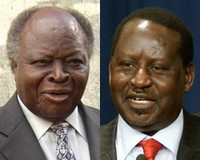In a country where political intrigue has often substituted for governance, Kenya's two-year-old National Accord offered a pragmatic solution to ending post-election violence and restoring democratic rule. Now the possibility of a new constitution offers fresh hope that Kenya's bumpy road back to democracy might get smoother. But as the country lurches toward constitutional reform, the tradition of "winner-take-all" politics -- as well as the accompanying fears of "loser-lose-all" outcomes -- is proving tough to leave behind. For Kenya, as with too many African countries, democracy is still thwarted by a zero-sum system that encourages bare-knuckle politics as well as social and ethnic destabilization.
In early 2008, more than 1,000 people were killed and tens of thousands displaced in post-election violence that followed Kenya's Dec. 27, 2007, presidential polls. Raila Odinga, opposition leader and head of the Orange Democratic Party (ODM), cried foul after losing by a thin margin to incumbent President Mwai Kibaki of the People's National Union (PNU), with European Union observers also citing significant irregularities. The crisis ended with a power-sharing National Accord brokered by former U.N. Secretary-General Kofi Annan, in which the positions of prime minister and two deputy prime ministers were created, with Odinga subsequently named as prime minister. While the accord was an essential step to ending the violence, the creation of a cabinet that included both Kibaki and Odinga has in time led to governance gridlock.
That makes Kenya's revamped constitution, another component of the National Accord, even more essential. Under the current governance system, there is no place in Kenya for the "loyal opposition," which bides its time while contributing to national decision-making. There are only the winners, with the rest left out in the cold. It remains to be seen whether Kenya can get itself back on track through broadly acceptable constitutional reform. The process was engineered to force consensus, but the political parties and their members of parliament seem reluctant to pursue it. Without greater cohesion around the new draft constitution, future peace and prosperity for this vitally important East African country seem a dim possibility.

